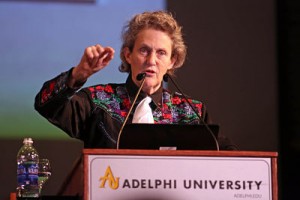The autism expert captivates hundreds with her Adelphi lecture.
 In the packed Thomas Dixon Lovely Ballroom of Adelphi’s Ruth S. Harley University Center on September 25, 2013, an audience of hundreds awaited Temple Grandin, Ph.D., and her all-too-famous mind with great anticipation, and they were not disappointed. After a quick, “Hello, I’m Temple Grandin,” and a short explanation about her need to keep water nearby, Dr. Grandin jumped into her lecture at full force.
In the packed Thomas Dixon Lovely Ballroom of Adelphi’s Ruth S. Harley University Center on September 25, 2013, an audience of hundreds awaited Temple Grandin, Ph.D., and her all-too-famous mind with great anticipation, and they were not disappointed. After a quick, “Hello, I’m Temple Grandin,” and a short explanation about her need to keep water nearby, Dr. Grandin jumped into her lecture at full force.
As someone who spent her early childhood communicating primarily nonverbal ways, Dr. Grandin admitted that it took an immense effort on her part to become both acquainted with socially acceptable behavior and comfortable with speaking in front of crowds. Looking back on her childhood, she stressed the importance of specificity and directness when communicating with children on the spectrum. All children—not just those on the spectrum—can benefit from being taught manners. For those with autism, it gives a set of rules to follow, an outline of proper behavior for social situations. For children without, it could help quell the urge to taunt their peers on the spectrum.
While Dr. Grandin feels strongly that children with autism should be led towards a better understanding of social behaviors, she in no way believes they should be limited from doing what they love. After all, she asserts, the world needs all kinds of minds, and rather than trying to get all children to think alike, parents, teachers and peers should help to develop talents in each individual’s “specialist brain.” Dr. Grandin later acknowledged the Bridges to Adelphi program as effective at acclimating students to the college environment while still helping them progress in their areas of strength.
Although Dr. Grandin will always be an autism advocate, she refers to her role as a professor of animal science as her “real job.” Her success at popularizing a more humane treatment of livestock is a real-life example of how a unique mind can change the status quo. Her advice to students is simply, “find what you’re good at,” but don’t just pursue it—share it, because what really helps the world is having all its different minds interact.
For further information, please contact:
Todd Wilson
Strategic Communications Director
p – 516.237.8634
e – twilson@adelphi.edu